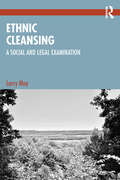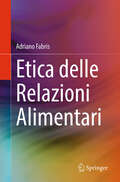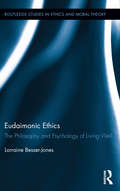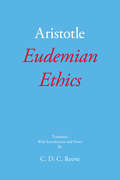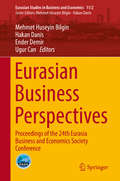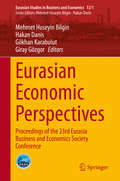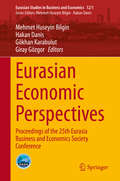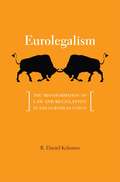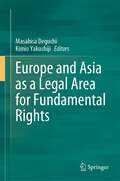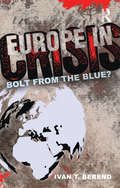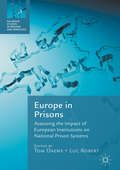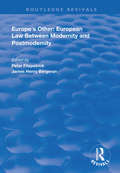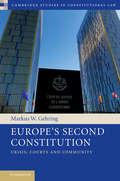- Table View
- List View
Ethisches Theater: Grundlagen des ethischen Managements und der strukturellen Transformation des Theaters
by Thomas SchmidtMit dem Konzept des Ethischen Theaters wird ein ganzheitliches Zukunftsmodell vorgestellt. Ausgangspunkt ist die Analyse der gegenwärtigen Krisen und der Komplexität in den deutschsprachigen Theatern, um die Grundlagen für ihren Transformationsprozess zu entwickeln. Mit dem Ethischen Theater wird ein Ziel dieses Prozesses vorgestellt: das ganzheitliches Zukunftsmodell einer Theater-Organisation des 21. Jahrhunderts, in der ethische Überlegungen erstmals in allen Prozessen handlungsleitend sind. Das Modell ist kompatibel mit den Interessen der Stakeholder und den wichtigen Reformprozessen, es ermöglicht die anstehende strukturelle Modernisierung der Theaterbetriebe. Unterstützt wird es durch das Konzept des Ethischen Theatermanagements, das erstmals über die klassischen Funktionen hinaus auch Aspekte der Diversität, der Nachhaltigkeit, der Ethik und der Zukunftsfähigkeit adressiert. Mit den erweiterten Funktionen des ethischen Managements werden auch weitere Möglichkeitsräume für die Zukunft der Kultur-Organisationen eröffnet.
Ethnic Cleansing: A Legal Qualification
by Clotilde PegorierThis book confronts the problem of the legal uncertainty surrounding the definition and classification of ethnic cleansing, exploring whether the use of the term ethnic cleansing constitutes a valuable contribution to legal understanding and praxis. The premise underlying this book is that acts of ethnic cleansing are, first and foremost, a criminal issue and must therefore be precisely placed within the context of the international law order. In particular, it addresses the question of the specificity of the act and its relation to existing categories of international crime, exploring the relationship between ethnic cleansing and genocide, but also extending to war crimes and crimes against humanity. The book goes on to show how the current understanding of ethnic cleansing singularly fails to provide an efficient instrument for identification, and argues that the act, in having its own distinctive characteristics, conditions and exigencies, ought to be granted its own classification as a specific independent crime. Ethnic Cleansing: A Legal Qualification, will be of particular interest to students and scholars of International Law and Political Science.
Ethnic Cleansing: A Social and Legal Examination
by Larry MayPutting forward the argument that the strength of democracies can be measured in how well minorities – especially ethnic and racial minorities – are treated by the majority, Larry May’s Ethnic Cleansing maintains that unjust ethnic cleansing is one of the greatest internal challenges to the modern institutions of pluralistic and multicultural states.In order to determine what constitutes the crime of ethnic cleansing, this book details crucial conceptual issues around the topic, such as what ethnicity means, what ethnic cleansing claims to achieve, why these acts are invariably harmful, and the conditions of restitution, reparation, and reconciliation – affirming that ethnic cleansing must be countered by existing institutions such as the International Criminal Court, which is uniquely situated to prosecute ethnic cleansing.The first major study to analyze ethnic cleansing from an explicitly normative and conceptual perspective in the last decade, the increase in number and complexity of cases of ethnic cleansing makes this a timely book to understand the challenges that confront contemporary society.
Ethnic Diversity and Federalism: Constitution Making in South Africa and Ethiopia
by Yonatan Tesfaye FesshaHow federalism can be used to provide recognition and accommodate ethnic groups is an important topic, not only in Africa, but in multi-ethnic communities around the world. Examining how institutions of multi-ethnic states have been designed to accommodate ethnic diversity while at the same time maintaining national unity, this book locates institutional responses to the challenges of ethnic diversity within the context of a federal arrangement. It examines how a federal arrangement has been used to reconcile the conflicting pressures of the demand for the recognition of distinctive identities, on the one hand, and the promotion of political and territorial integrity, on the other. Comparative case studies of South Africa and Ethiopia as the two federal systems provide a contrasting approach to issues of ethnic diversity. Suggesting new ways in which federalism might work, the author identifies key institutions lessons which will help to build an all-inclusive society.
Ethnic Diversity, Plural Democracy and Human Dignity: Challenges to the European Union and Western Balkans (Ius Gentium: Comparative Perspectives on Law and Justice #99)
by Jānis Pleps Damir Banović Mario Krešić Alberto Carrio Sampedro“Given their ethnic diversity, to what extent, and at what cost and benefit to human dignity, can European countries adopt and adapt plural democracy?” The contributors to this volume offer answers to this question from a variety of multidisciplinary perspectives within the framework of the integral theory of law and the state. Their shared aim is to explain legal phenomena in the context of other relevant issues and to identify, analyse and critique conceptualizations, problems and situations. This volume is rooted in the historical and contemporary European experience with special cases from Bosnia and Hercegovina, Croatia, Latvia, Slovenia, Spain and Canada which are relevant for understanding the European problem. Solutions to the problem are sought through innovative interpretations of the rule of law, democracy and human dignity, which are followed by argumentation about how these concepts, when recognized as European legal principles, can be implemented in order to avoid ethnic conflicts.Following an introduction that defines the problem at the centre of the book and explains how legal theory can be used to address it, the book consists of eleven contributions divided into three thematic sections. The first covers topics concerning the European principles which can help avoid ethnic conflicts: the principle of compulsory adjudication in interstate relations, the principle of democracy, and principles regarding the recognition of individual and collective identities. These European principles are then investigated by drawing on legal and political theories. The second section presents three ways of conceptualizing ethnical needs in multi-ethnic states: asymmetric federalism, dêmoicratic account and cooperative federalism. The third and final section elaborates on issues concerning the protection of minority rights: the role of judicial ideology in protecting minority rights, citizenship, the EU mechanism for the protection of minority rights, and the importance of remembering tragic events affecting minorities.
Ethnicity and International Law
by Mohammad ShahabuddinEthnicity and International Law presents an historical account of the impact of ethnicity on the making of international law. The development of international law since the nineteenth century is characterised by the inherent tension between the liberal and conservative traditions of dealing with what might be termed the 'problem' of ethnicity. The present-day hesitancy of liberal international law to engage with ethnicity in ethnic conflicts and ethnic minorities has its roots in these conflicting philosophical traditions. In international legal studies, both the relevance of ethnicity, and the traditions of understanding it, lie in this fact.
Ethnographic Worldviews
by Robert E. Rinehart Karen N. Barbour Clive C. PopeThis book discusses ethnography from the three points of view of Emerging Methodologies, Practice and Advocacy, and Social Justice and Transformation, with an over arching emphasis on researchers' and participants' worldviews. While these three thematic threads cut across each other, the actual chapters will be located so that the reader understand many of the current issues and concerns--with specific exemplars from around the globe--for ethnographers. 'Ethnographic Worldviews: Transformations and Social Justice' will have its "finger on the pulse" of contemporary ethnography. Chapters demonstrate up-to-the-moment awareness of ethnographic methods, concerns, and subject matters within contemporary ethnographic writing. Authors are deeply engaged in both their subject matter and their method. For example, discussion of ethical issues surrounding visual methods of "collecting" for photo-ethnographies is anticipated as a potential hot topic for this book. Unlike other ethnographic books which often suggest "giving voice to others", this book will actually give voice to a wide variety of perspectives, from the points of view of researchers.
Ethos, Bioethics, and Sexual Ethics in Work and Reception of the Anatomist Niels Stensen (1638-1686)
by Frank SobiechThis book offers a unique and comprehensive outline of the ethos, the bioethics and the sexual ethics of the renowned anatomist and founder of modern geology, Niels Stensen (1638-1686). It tells the story of a student who is forced to defend himself against his professor who tries to plagiarize his first discovery, the "Ductus Stenonis": the first performance test for the young researcher. The focal points are questions of bioethics, especially with regard to human reproduction, sexual ethics, the beginning of life and the ensoulment of the embryo, together with frontiers of pastoral care. The book delineates Stensen's ethos as well as its medico-ethical and theological implications and reception by researchers and physicians from the 17th century until today, and asks about his lasting significance. Despite dating back more than 300 years, Stensen's character and his work offer up surprisingly topical answers to current questions on the nature of professional ethics in medical science and practice. Furthermore, "Ethos, Bioethics, and Sexual Ethics in Work and Reception of the Anatomist Niels Stensen (1638-1686): Circulation of Love" is the first academic book on bioethics and sexual ethics with a foreword by the Prefect of the Congregation for the Doctrine of the Faith. A fascinating book for bioethicists, physicians, members of health professions, scientists, and theologians.
Etica delle Relazioni Alimentari
by Adriano FabrisQuesto libro presenta e discute alcuni problemi di fondo che emergono oggi nelle relazioni alimentari e che riguardano i nostri stili di vita. I primi tre capitoli si concentrano sulle questioni che concernono l'alimentazione e sul rapporto con ciò che possiamo o non possiamo mangiare, per motivi etici, religiosi o semplicemente collegati al nostro benessere. Il quarto capitolo tratta dell'atto del bere e del nostro rapporto con l'acqua, nell’ottica della sostenibilità, della giustizia, del corretto uso e dell’equa distribuzione delle risorse idriche. In generale, l’idea che viene sostenuta nel libro è che per gli esseri umani gli atti del mangiare e del bere non dipendono dalla volontà del soggetto, ma si svolgono in contesti di relazione già dati e mettono in gioco, o impediscono, ulteriori relazioni: con altri esseri viventi, con altri esseri umani, con noi stessi. Tali relazioni possono svilupparsi bene oppure male. Se sono attuate male risultano distruttive. Bisogna capire come ciò accade e agire di conseguenza. L’etica ci aiuta a farlo, facendoci riflettere su questi problemi e individuando soluzioni concrete. Scritto per studenti universitari e per studiosi di etiche applicate, il libro è una lettura stimolante e provocatoria anche per un pubblico più ampio.
Eudaimonic Ethics: The Philosophy and Psychology of Living Well (Routledge Studies in Ethics and Moral Theory)
by Lorraine L BesserIn this book, Lorraine Besser-Jones develops a eudaimonistic virtue ethics based on a psychological account of human nature. While her project maintains the fundamental features of the eudaimonistic virtue ethical framework—virtue, character, and well-being—she constructs these concepts from an empirical basis, drawing support from the psychological fields of self-determination and self-regulation theory. Besser-Jones’s resulting account of "eudaimonic ethics" presents a compelling normative theory and offers insight into what is involved in being a virtuous person and "acting well." This original contribution to contemporary ethics and moral psychology puts forward a provocative hypothesis of what an empirically-based moral theory would look like.
Eudemian Ethics (The New Hackett Aristotle)
by AristotleThis new translation of Aristotle's Eudemian Ethics, noteworthy for its consistency and accuracy, is the latest addition to the New Hackett Aristotle series. Fitting seamlessly with the others in the series, it enables Anglophone readers to read Aristotle&’s works in a way previously impossible. Sequentially numbered endnotes provide the information most needed at each juncture, while a detailed Index of Terms guides the reader to places where focused discussion of key notions occurs.
Eurasian Business Perspectives: Proceedings of the 24th Eurasia Business and Economics Society Conference (Eurasian Studies in Business and Economics #11/2)
by Mehmet Huseyin Bilgin Hakan Danis Ender Demir Ugur CanThis volume of Eurasian Studies in Business and Economics includes selected papers from the 24th Eurasia Business and Economics Society (EBES) Conference, held in Bangkok. The theoretical and empirical papers gathered here cover diverse areas of business and management from different geographic regions; yet the main focus is on the latest findings on evolving marketing methods, analytics, communication standards, and their effects on customer value and engagement. The volume also includes related studies that analyze sustainable consumer behavior, and business strategy-related topics such as cross-border restructuring, quality management standards, and the internationalization of SMEs.
Eurasian Economic Perspectives: Proceedings of the 23rd Eurasia Business and Economics Society Conference (Eurasian Studies in Business and Economics #13/1)
by Mehmet Huseyin Bilgin Hakan Danis Gökhan Karabulut Giray GözgorThis book presents selected papers from the 23rd Eurasia Business and Economics Society (EBES) Conference, held in Madrid, Spain. While the theoretical and empirical papers presented cover diverse areas of economics and finance in different geographic regions, the main focus is on the latest research concerning international trade, public economics, and regional studies. The book also includes studies on the economics of innovation, inequality and tourism.
Eurasian Economic Perspectives: Proceedings of the 25th Eurasia Business and Economics Society Conference (Eurasian Studies in Business and Economics #12/1)
by Mehmet Huseyin Bilgin Hakan Danis Gökhan Karabulut Giray GözgorThis volume of Eurasian Studies in Business and Economics includes selected papers from the 25th Business and Economics Society (EBES) Conference, held in Berlin, Germany, in May 2018. While the theoretical and empirical papers presented cover diverse areas of economics and finance from different geographic regions, the main focus is on the latest research in the economics of innovation, investment and risk management together with regional studies. The book also includes studies on law and regulation themes such as economic offences by women, formation of contracts via the internet and public tender for residents of communes.
Eurolegalism: The Transformation of Law and Regulation in the European Union
by R. Daniel KelemenDespite western Europe's traditional disdain for the United States' "adversarial legalism," the European Union is shifting toward a very similar approach to the law, according to Daniel Kelemen. Coining the term "eurolegalism" to describe the hybrid that is now developing in Europe, he shows how the political and organizational realities of the EU make this shift inevitable. The model of regulatory law that had long predominated in western Europe was more informal and cooperative than its American counterpart. It relied less on lawyers, courts, and private enforcement, and more on opaque networks of bureaucrats and other interests that developed and implemented regulatory policies in concert. European regulators chose flexible, informal means of achieving their objectives, and counted on the courts to challenge their decisions only rarely. Regulation through litigation-central to the U.S. model-was largely absent in Europe. But that changed with the advent of the European Union. Kelemen argues that the EU's fragmented institutional structure and the priority it has put on market integration have generated political incentives and functional pressures that have moved EU policymakers to enact detailed, transparent, judicially enforceable rules-often framed as "rights"-and back them with public enforcement litigation as well as enhanced opportunities for private litigation by individuals, interest groups, and firms.
Europaarbeit der Gewerkschaft ver.di: Eine feldtheoretische Perspektive (Europa – Politik – Gesellschaft)
by Nele DittmarIn der sozialwissenschaftlichen Debatte wird oft ein pessimistisches Bild der Bedingungen und Perspektiven europäischen gewerkschaftlichen Handelns gezeichnet. Selten wurde aber bisher in eine nationale Gewerkschaft hineingeschaut und gefragt, ob und inwiefern die innergewerkschaftlichen (Macht-)Verhältnisse ihre europabezogene Arbeit beeinflussen. Diese Arbeit setzt dort an und lenkt auf der Suche nach den Möglichkeiten und Grenzen gewerkschaftlicher Interessenvertretung in Europa den Blick in eine nationale Gewerkschaft hinein. Am Beispiel der Vereinten Dienstleistungsgewerkschaft ver.di bringt dies einerseits europabezogene Praktiken zum Vorschein, die aus einer Makroperspektive verdeckt bleiben. Andererseits werden neue Erkenntnisse zu Hindernissen gewerkschaftlicher Europaarbeit gewonnen, die in den innerorganisatorischen Strukturen und Machtrelationen selbst begründet sind. Für den Blick in die Gewerkschaft wird in dieser Arbeit eine feldtheoretische Perspektive eingenommen. Damit wird ihre „Europaarbeit“ durch das Zusammenspiel der Position der Gewerkschaft in anderen Feldern (wie dem der deutschen und der europäischen Arbeitsbeziehungen) und den Kräfteverhältnissen innerhalb der Gewerkschaft selbst erklärt.
Europarecht
by Walter FrenzEuroparecht ist vor allem Fallrecht anhand aktueller Entscheidungen. Diese werden in diesem Lehrbuch ausführlich dargestellt, so zu den Grenzen der Finanzhilfe für Griechenland (Urteil Pringle), der Ökostromförderung (Urteil Alands Vindkraft) sowie der zu gewährenden Sozial- und Gesundheitsleistungen (Urteile Hartz IV und Abdida). Breiten Raum nehmen auch die Verschränkungen von Unions- und nationalem Recht (OMT-Vorlagebeschluss des BVerfG; PKW-Maut), die Grundrechte (Datenschutz) sowie das Wettbewerbsrecht (Microsoft, Amazon, Energiewende) ein. Zahlreiche Übersichten und Fälle mit Musterlösung veranschaulichen den Stoff. Bereits eingearbeitet ist das Urteil des EuGH zum Ankauf von Staatsanleihen auf dem Sekundärmarkt.
Europarecht: Mit Klimaschutz, Digitalisierung, Corona, ausführlichem Datenschutz (Springer-Lehrbuch)
by Walter FrenzDieses Lehrbuch zum Europarecht nimmt vor allem die aktuellen Entwicklungen in den Blick. Die Corona-Krise ist bereits ausführlich berücksichtigt (Coronahilfen, Schutzansprüche, Impfpflicht, Einstieg in die Fiskalunion?); Klimaschutz (EU-Klimagesetz, Green Deal, Anspruch auf mehr Klimaschutz?, Kohleausstieg) und Digitalisierung sind in eigenen Kapiteln dargestellt. Aber auch die klassischen Materien haben sich fortentwickelt, insbesondere durch die Rechtsprechung, die ausführlich in zahlreichen Beispielen und Fällen mit Musterlösung (Ökostromförderung, CETA-Abkommen) wiedergegeben ist. So werden die Grundfreiheiten immer schärfer geprüft (Pkw-Maut), ebenso die Grundrechte (EU-Haftbefehl, Vorratsdatenspeicherung). Herausragende Bedeutung hat der Datenschutz in diversen aktuellen Judikaten, die detailliert und kritisch dargestellt sind – auch in ihren Konsequenzen etwa für eine Corona-Warnapp. Besonderes Gewicht hat das Verhältnis von Unions- und nationalem Recht: Ist das BVerfG entsprechend seinem PSPP-Urteil Richter über den EuGH? Ist es umgekehrt nach seinem Recht auf Vergessen II-Judikat ein Garant der EU-Grundrechte? Die begleitend angebotene SN Flashcards Lern App bietet exklusives Zusatzmaterial und erhöht den Lernerfolg zusätzlich.
Europe and Asia as a Legal Area for Fundamental Rights
by Masahisa Deguchi Kimio YakushijiThis book explores the possibility of an Asian legal sphere based on the model of Europe. It features articles written by leading experts from Europe and Asia. After centuries of violent conflicts, Europe began a process of integration which leads to 75 years of peace and a community with the common values of freedom, fundamental rights, and the rule of law. But the circumstances that lead to the unification of Europe differ from current-day Asia: Besides the huge economic gaps between neighboring countries and a wide variety of political forms of government, Asia also does not share the unifying narrative of post-WWII Europe.From an economic point of view, Asia is a highly developed region; despite the differences between the political systems, the region has grown together—economically and in recent times also politically. However, the legal systems of the respective countries have not created the necessary conditions for a peaceful coexistence. Can Europe be a model for Asia? Based on the history and development of the European unification process, this book asks the question to what extent Asia can look to Europe as a model and what lessons can be learned.
Europe in Crisis: Bolt from the Blue? (Variorum Collected Studies #739)
by Ivan BerendThis book analyzes the European Great Recession of 2008-12, its economic and social causes, its historical roots, and the policies adopted by the European Union to find a way out of it. It contains explicit debates with several economists and analysts on some of the most controversial questions about the causes of the crisis and the policies applied by the European Union. It presents the cases of Iceland, Greece and Ireland, the countries that first declined into crisis in Europe, each of them in a different way. Iceland is a case study for reckless banking practices, Greece of reckless public spending, and Ireland of reckless household indebtedness. At least seven other countries, mostly from the peripheries of Europe, had similarly reckless banking and spending practices. In the center of the book are the economic and social causes of the crisis. Contemporary advanced capitalism became financialized, de-industrialized and globalized and got rid of the "straitjacket" of regulations. Solid banking was replaced by high-risk, "casino-type" activity. The European common currency also had a structural problem — monetary unification without a federal state and fiscal unification. The other side of the same coin is European hyper-consumerism. A new lifestyle emerged during two super-prosperous periods in the 1950s to 1960s, and during the 1990s to 2006. Trying to find an exit policy, the European Union turned to strict austerity measures to curb the budget deficit and indebtedness. This book critically analyzes the debate around austerity policy. The creation of important supra-national institutions, and of a financial supervisory authority and stability mechanisms, strengthens integration. The correction of the euro’s structural mistake by creating a quasi-fiscal unification is even more important. The introduction of mandatory fiscal rules and their supervision promises a long-term solution for a well-functioning common currency. These measures, meanwhile, create a two-tier European Union with a fast-track core. This book suggests that the European Union will emerge stronger from the crisis. This book will be of particular interest to students and researchers of economics, history, political science and international finance, but will also prove profitable reading for practitioners and the interested public.
Europe in Prisons
by Tom Daems Luc RobertThis volume explores the role that European institutions have come to play in regulating national prisons systems. The authors introduce and contribute to advancing a new research agenda in international penology ('Europe in prisons') which complements the conventional comparative approach ('prisons in Europe'). The chapters examine the impact - if any - that institutions such as the European Committee for the Prevention of Torture and Inhuman or Degrading Treatment or Punishment and the European Court of Human Rights have had on prison policy throughout Europe. With contributions from a wide range of countries such as Albania, Austria, Belgium, Ireland, Norway and Spain, this edited collection offers a wide-ranging and authoritative guide to the effects of European institutions on prison policy.
Europe in the Global Space Economy (SpringerBriefs in Space Development)
by Clelia Iacomino Patrizia CaraveoThis book analyzes the policies and space economy programs of major space-faring nations and explores whether the present institutional set-up in Europe is adequate to address the challenges. At the core of the discussion are the relative roles of governments and markets in a highly dynamic panorama that involves advancements in science, modifications in technology and organization, and the introduction of new rules of behavior. After a close examination of the history of development of the space economy, and the shift from the centralized model to deregulation and the opening up of space activities to commercial companies, a wide-ranging overview of global space governance is provided. National and regional perspectives are discussed, and the current role of commercial actors in the global space system is elucidated. The various challenges faced by Europe are then examined, including the threat posed by institutional and market fragmentation to the emergence of European companies able to compete with companies of nations such as the USA. The final part of the book analyzes proposals for reforming of the space system in Europe and offers a vision for future European space policy.
Europe's Other: European Law Between Modernity and Post Modernity (Routledge Revivals)
by Peter Fitzpatrick James Henry BergeronFirst published in 1998, this volume focuses critically on the European identity of the law of the European Union, of national law and the law of human rights. It is primarily concerned with the ways in which European identity is created through the rejection of a malign Other constituted in opposition to all that a virtuous Europe and its law, are supposed to be. The construction of this Other is explored in claims of the EU legal order to a unity and coherence transcending the nation-state; in the assertion of a European identity through laws effecting cultural, immigration and security policies; and in the claims to a lofty 'European-ness' made by national law and the European Convention on Human Rights. A major contribution to the understanding of European Law in the terms of the debates over modernity and postmodernity, this book will interest those involved with studies of the European Union and its law, with critical legal studies and also with socio-legal studies.
Europe's Second Constitution: Crisis, Courts and Community (Cambridge Studies in Constitutional Law #24)
by Markus W. GehringThe process of European constitutionalisation is met with extensive scepticism in current national legal and political spheres and in broader circles of public opinion across Europe. By shedding light on these concerns, this book reveals a widespread misunderstanding of constitutional federalism, which permeates the Member State courts, popular media, and many academic communities. A failure to address confusion over this fundamental concept is leading us towards impoverished development of the EU's 'Second Constitution', and even ensuring that the role of both domestic and international European courts in enriching the constitutionalisation process is overlooked and undervalued. In a bid to avoid such consequences, this book explores how federalism and further constitutionalisation - rightly understood in a dialogue of the European courts - may actually change this process and allow a clearer advance toward Europe's Second Constitution for, but also with, the people of Europe.
European Agencies and Risk Governance in EU Financial Market Law (Routledge Research in EU Law)
by Paul WeismannThe phenomenon of ‘agencification’ describes the EU legislator’s increasing establishment of European agencies to fulfil tasks in a variety of EU policies. The creation of these decentralised administrative entities raises a number of questions; for example, on the limits to such delegation of powers, on the agencies’ institutional development and possible classification, and on the role of comitology committees as an institutional alternative. This book examines the EU’s ‘agencification’ with regard to these questions, on the basis of and with reference to which the focus is laid on the European agencies operating in the field of financial market risk governance. This analysis not only encompasses the three European Financial Market Supervisory Authorities (the ESAs), but also takes into account the institutional change brought about by the Banking Union, more specifically the Single Supervisory Mechanism (SSM) and the Single Resolution Mechanism (SRM). While the SRM sets in place a new European agency, the Single Resolution Board (SRB), the SSM establishes and empowers a new body within the organisation of the European Central Bank (ECB), the Supervisory Board. By exploring the organisation, the tasks and the powers of these actors in financial market regulation and supervision, the book points at the current peak of the institutional development of European agencies and assesses organisation and unprecedented powers with a view to their compliance with EU law, in particular the Treaties and the respective case law of the European courts. As an evaluation of various aspects of the progressing centralisation of regulatory power on the EU level, which is exercised by an increasingly decentralised administrative apparatus, this book will be of great interest and use to students and scholars of EU law, financial law and regulation, and European politics.
